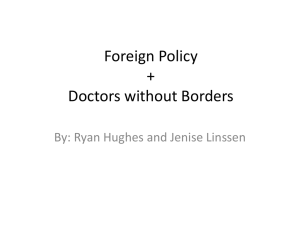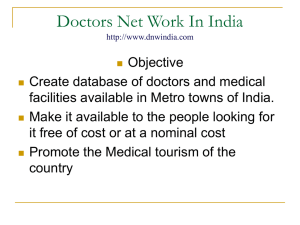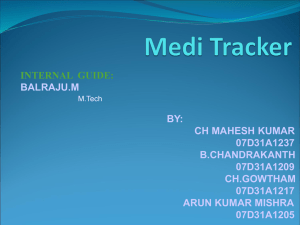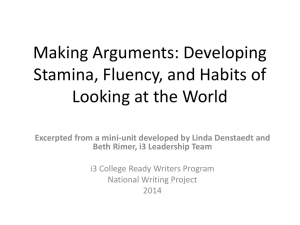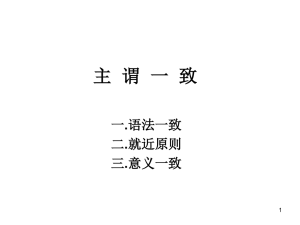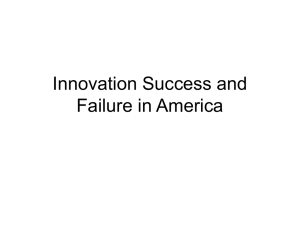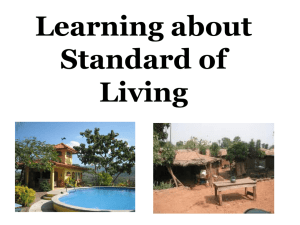4.1 doctors without borders
advertisement
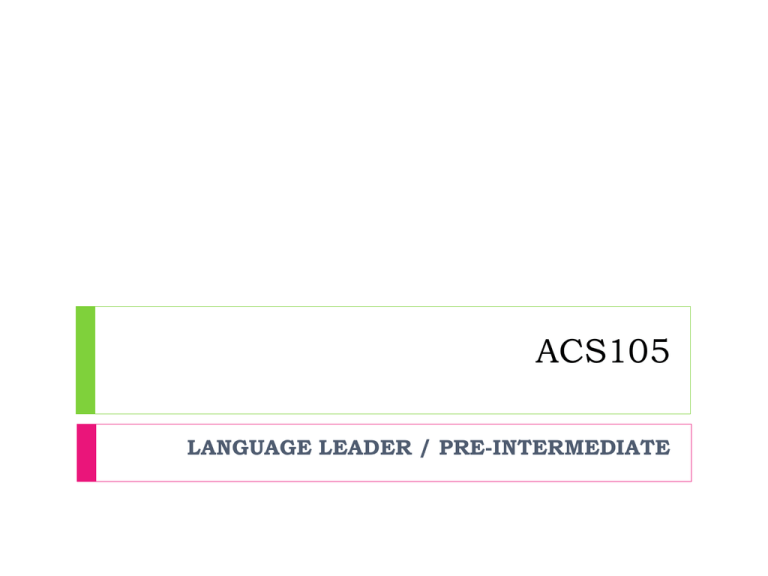
ACS105 LANGUAGE LEADER / PRE-INTERMEDIATE What is the topic of today’s lesson? UNIT 4: HEALTH 4.1 DOCTORS WITHOUT BORDERS clinic- (n): a place where people get medical treatment. Bring your baby to the clinic and we'll take a look at her. 4.1 DOCTORS WITHOUT BORDERS disease-illness(n): a disorder of structure or function in a human, animal, or plant, especially one that produces specific symptoms The first symptom of the disease is a very high temperature. 4.1 DOCTORS WITHOUT BORDERS injury(n): physical harm o r damage to someone's body caused by an accident or an attack: Several train passengers received serious injuries in the crash 4.1 DOCTORS WITHOUT BORDERS surgery- (n): a medical treatment in which a doctor cuts open your body to repair or remove sth. The patient had surgery on his heart. 4.1 DOCTORS WITHOUT BORDERS surgeon(n): a doctor who does operations. My aunt is a surgeon at Atatürk Hospital. 4.1 DOCTORS WITHOUT BORDERS malnutrition(n): a serious medical condition caused by not eating enough food. Many of the children in African countries suffer from malnutrition. 4.1 DOCTORS WITHOUT BORDERS health insurance (n. phr.): an arrangement in which you make regular payments to an insurance company in exchange for that company paying most or all of the costs of your medical care Do you have a health insurance? 4.1 DOCTORS WITHOUT BORDERS Exercise 1a Exercise 1b: Describe the healthcare system in our country. 4.1 DOCTORS WITHOUT BORDERS Do you know any national or international organization that helps the people in need of health care? Have you heard of Red Cross or Red Crescent? Organization whose humanitarian mission is to protect the lives of victims of war and internal violence and to provide them with assistance. 4.1 DOCTORS WITHOUT BORDERS charity(n): an organisation that gives money, goods or help to people who are poor or ill. She does a lot of work for charity. UNICEF is an international charity. 4.1 DOCTORS WITHOUT BORDERS disaster(n): (an event such as an accident, flood that results in) great harm, damage, or death. This is one of the worst natural disasters ever to happen in the area. 4.1 DOCTORS WITHOUT BORDERS podcast(n): a radio prog ramme that is stored in a digital form that you can download from the internet and play on a computer 4.1 DOCTORS WITHOUT BORDERS facility(n): a place, especia lly including buildings,where a particular activity happens medical facilities sports facilities 4.1 DOCTORS WITHOUT BORDERS Reading p.32 What is IMA? Where does IMA work? International Medical Aid in poor and disaster hit areas of the world Where can you listen about IMA? On its website 4.1 DOCTORS WITHOUT BORDERS 4.1 DOCTORS WITHOUT BORDERS continent(n): one of the seven main areas of land on earth 4.1 DOCTORS WITHOUT BORDERS diet(n): the kind of food that you eat each day a healthy/balanced/varied diet Rice is the staple diet (= most important food) of many people in China. 4.1 DOCTORS WITHOUT BORDERS reduce(v): to make sth become less in size, amount, price etc. The plane reduced speed as it approached the airport. My weight reduces when I stop eating sugar. 4.1 DOCTORS WITHOUT BORDERS raise money(v): to get people to give money to help people or to do a particular job 4.1 DOCTORS WITHOUT BORDERS massive(adj): very big They've got a massive dog. 4.1 DOCTORS WITHOUT BORDERS destruction(n): the action or process of causing so much damage to something that it no longer exists or cannot be repaired: Many people are very concerned about the destruction of the rainforests. 4.2 BRAIN FOOD What does “brain food” mean? What should we do to feed our brain? 4.2 BRAIN FOOD blood pressure (n. phr): a measure of the pressure at which the bloodflows through the body: The nurse will take your blood pressure in a moment. 4.2 BRAIN FOOD nutrition(n): he substances that you take into your body asfood and the way that they influence your health: Good nutrition is essential if patients are to make aquick recovery. 4.2 BRAIN FOOD mental(adj): relating to the mind, or involving the process of thinking: The family has a history of mental disorder. 4.2 BRAIN FOOD elderly(n): old elderly relatives/parents 4.2 BRAIN FOOD Ban (v): to forbid (= refuse to allow ) something, especially officially: The film was banned (= the government preventedi t from being shown) in several countries. 4.2 BRAIN FOOD Speaking and Vocabulary p. 34 Do the exercise 1 Look at the picture in the reading text. What types of food can you see? Reading p. 34 Read the text and do the exercises 2a, 2b, and 2c 4.3 SCENARIO: Health at Work What can you see on the photos on pages 36 and 37? Where are these photos taken? What health conditions are being shown? What could be the cause of these conditions? Have you ever been or seen situations like these? 4.3 SCENARIO: Health at Work Suffer (v): to experience emotional or physical pain She's been suffering from (= been ill with) cancer for two years. He suffered a lot when his wife left him. 4.3 SCENARIO: Health at Work Neck(n): the part of the body that joins the he ad to the shoulders: He had the thickest neck I'd ever seen. She wore a gold chain aro und her neck. 4.3 SCENARIO: Health at Work Stressed (adj): so worried and tired that you cannot relax She's been feeling very stressed since she startedher new job. 4.3 SCENARIO: Health at Work Listen and do the exercises 2a and 2b Intonation of yes/no questions Exercises 3a, 3b and 3c 4a.listen and find out the problems of David 4b. Fill in the gaps 4c. Can you think of any more advice for David? 4.3 SCENARIO: Health at Work KEY LANGUAGE How do we give advice? You should study English. (should + V1) You should study English in order to pass the course. You should study English so that you can pass the course. You should study English because it is important for you. Exercises 5a, 5b and 6 4.3 SCENARIO: Health at Work Task: giving health advice p.37 Work in groups of 4 Students A and B will be health officers (doctors) Students C and D you are employees Morgan and Jones. 4.4 STUDY AND WRITING SKILLS Discuss the questions with a partner Open p. 116 and read the short story and aswer the questions in exercise 2. Look back at the text and underline the unknown words. Ask your partner the words. Do the exercises 4a, 4b, 4c, 4d, 5 and 6. 4.4 STUDY AND WRITING SKILLS Writing Skills Do you send emails to your friends? How often do you send emails? What do you write about? How much do you usually write? 4.4 STUDY AND WRITING SKILLS Read the email and answer the questions. Exercise 8. Do the other exercises.
